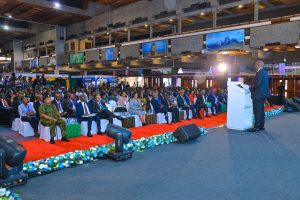Driven by convenience and cost-effectiveness, staycations are increasingly seen as a practical and affordable alternative to international travel.
The UAE hospitality sector is experiencing a sharp rise in demand for staycations, as more residents opt to spend their holidays within the country instead of traveling abroad, according to the KPMG Dubai Hospitality Report released in April 2025.
Driven by convenience and cost-effectiveness, staycations are increasingly seen as a practical and affordable alternative to international travel. By avoiding long-haul flights, high-priced overseas accommodations, and fluctuating foreign exchange rates, UAE residents are choosing to explore the attractions in their backyard, from pristine beaches and majestic mountains to bustling cities and cultural landmarks.
This trend is not only redefining local travel preferences but also providing a boost to the domestic economy. Hotels, restaurants, and entertainment venues across the country are benefitting from increased local spending, particularly during weekends and off-peak seasons.
“Staycationers aren’t just booking rooms, they’re engaging in the full hospitality experience,” the KPMG report noted. “From utilising hotel amenities to dining at in-house restaurants and participating in curated experiences, residents are helping to diversify and stabilise revenue streams for the hospitality sector.”
With the “living local” movement gaining momentum, UAE hospitality businesses are responding with creative packages and promotions.
These include family-friendly deals, upgraded leisure facilities, and tailored experiences that highlight the country’s rich and varied attractions. New developments are also underway to meet rising demand.
During the nine-day Eid Al Fitr holiday in 2024, the UAE recorded a notable spike in staycation bookings from both residents and travellers from neighboring GCC countries, compared to the same period the previous year.
Dubai hospitality poised for continued growth
Looking ahead, Dubai’s hospitality industry is set for sustained expansion through 2025, supported by strong economic fundamentals, proactive government policies, and a thriving real estate market spanning both luxury and affordable segments.
The city’s Vision 2025 strategy, focused on tourism, infrastructure, and economic diversification, is paving the way for Dubai to solidify its position as a global tourism hub. Industry projections indicate:
- 11,300 new hotel rooms are expected to open in Dubai by 2027.
- Under the Dubai Economic Agenda D33, the emirate aims to rank among the top three global tourism destinations.
However, to maintain competitiveness, hospitality players will need to prioritise innovation, sustainability, and the delivery of unique, localised guest experiences.
Central Hotels & Resorts capitalises on the domestic travel boom
As Dubai grows into a year-round destination for both international and local travelers, Central Hotels & Resorts, one of the fastest-growing homegrown hospitality groups, is reaping the benefits of a transformed tourism landscape defined by leisure, locality, and lifestyle.
In recent months, the group has recorded a 25 per cent increase in bookings from UAE residents. The surge is fuelled by families, couples, and millennial groups opting for short, curated getaways that offer luxury without the hassle of international travel.
“This is not just a seasonal shift—it reflects a deeper change in how residents view leisure,” said Abdulla Ahmad Ali Al Abdulla Al Ansari, COO and group general manager of Central Hotels & Resorts. “Domestic guests, particularly Emirati families and long-time expats, are rediscovering Dubai’s appeal. Family travel now contributes nearly 30 per cent of our domestic revenue, and demand for interconnecting rooms and suites has risen by over 40 per cent this summer compared to last year.”
Tailored experiences redefine the staycation model
To meet growing domestic demand, Central Hotels & Resorts has revamped its offerings to focus on convenience, comfort, and curated experiences. Flagship properties like Royal Central Hotel The Palm, Canal Central Hotel Business Bay, and C Central Resort The Palm cater to diverse tastes, from families lounging poolside to couples enjoying panoramic views and regional dining.
“We’ve introduced value-added offers such as ‘Kids Go Free’ promotions, enhanced family packages, flexible check-in/out, and upgraded leisure amenities,” Al Ansari explained. “These thoughtful touches are turning short stays into meaningful escapes.”
Strategic locations have also played a key role. By operating in some of Dubai’s most vibrant neighbourhoods, Central offers guests both the connectivity of a city hotel and the tranquility of a resort. Whether it’s a spontaneous summer weekend or a planned long weekend, the group is becoming the preferred choice for domestic travelers who seek comfort without compromise.
Sustaining growth through domestic demand
The domestic travel surge is helping hotels flatten seasonal dips in occupancy, particularly during the traditionally slower summer months.
“Domestic leisure travel is expected to account for 35 per cent of our total occupancy this summer, up from 28 per cent last year,” said Al Ansari. “That’s a significant shift, and it’s enabling us to maintain strong performance even during what was once considered the off-season.”
The wider market data supports this trend. According to Visa’s 2025 UAE Travel Pulse, domestic travel spending rose by 68 per cent year-on-year, with Dubai accounting for 70 per cent of in-country travel bookings. Meanwhile, STR’s 2024 report revealed Dubai welcomed 18.7 million overnight visitors, boasting an average occupancy rate of 78.2 per cent and a RevPAR of Dhs421, figures that position Dubai as a regional and global leisure powerhouse.
Looking ahead: A new era of local tourism
As Dubai continues to invest in innovative tourism strategies and new attractions, companies like Central Hotels & Resorts are doubling down on their commitment to provide personalised, value-driven hospitality. The growing appetite for local experiences signals a shift in traveler expectations—one where quality, culture, and convenience converge.
“For many residents, there’s no longer a need to board a plane to feel like they’re on holiday,” Al Ansari concluded. “Dubai itself is the destination.”
Source: Gulf Business






